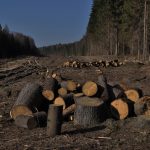
The DRC has filed criminal complaints against Apple subsidiaries in Belgium and France, accusing them of using conflict minerals in their supply chain.
Operators across the regional have signalled a significant weakening of demand in international markets. Some mills servicing the Chinese market have temporarily ceased operations due to falling Chinese timber imports, others, have pivoted production to species in demand in the EU notably azobe for the Dutch market and timbers such as padouk for Belgium, agba for Portugal and bahia for Italy.
This article summarizes the science behind World Forest ID, but also gives a glimpse at the support provided by Australia, work now being done by IKEA (which used to source extensively from Russia and Belarus), and a recent Belgian investigation into illegally sourced wood imports.
Also reported here: Keeping Sanctioned Russian Timber Out of the EU Is Tricky. This Nonprofit Has a Solution. – WSJ
A new Greenpeace report, Nature Crime Files – Romania – Greenpeace International, followed the traces to the suppliers of furniture companies, such as IKEA. By closely examining the entire supply chain, from logging sites to wood depots, including scrutinising transport permits with geolocation attributes, and visiting processing facilities Greenpeace CEE found old-growth or other high conservation value destruction linked to at least seven different IKEA suppliers in Romania. Investigations identified at least 30 IKEA products, and some of IKEA’s well-known furniture, originating from these producers, raising a concern that wood from old-growth forests could ultimately end up in homes all over Europe and beyond.
When Russia invaded Ukraine in February 2022, sanctions swiftly followed, including a total ban on Russian timber imports into the European Union (EU) from July 2022. Belgium, one of the staunched supports of the EU ban, has become a profitable destination for Russian wood. Using a forensic laboratory at the Royal Museum for Central Africa in Tervuren, inspectors determined that several wood shipments from Russia had arrived in Belgium. The number of fines imposed for illegal harvests almost tripled in 2023.
“But an impediment is a distinct lack of inspectors,” Wynant said. “There are now fewer than five timber inspectors working full-time in Belgium, but there are 4500 timber importers,”according to the article .
A cross-border probe, led by ICIJ and first published in March 2023, involved 44 media partners globally and documented how Western environmental auditing firms and governments failed to stop the trade of wood logged in conflict zones.
The findings supported a June investigation from ICIJ partners Paper Trail Media, Der Spiegel, ZDF and others that similarly revealed how Russian timber continued to circumvent the EU’s embargo, making its way into the bloc by routing through countries like China, Turkey, Kazakhstan and Kyrgyzstan.
New report by EIA highlights Peru’s Congress approved new legislation that legalized much of alleged unlawful deforestation by some of the companies featured in the report. As a result, EIA claims that tainted palm oil and cocoa produced by firms that operated for years with impunity may continue being traded to unwitting European and Peruvian consumers, setting a dangerous precedent risking more illegal Amazon clearance in the future.
Russian mercenaries with close ties to President Vladimir Putin and a logging contractor exposed for funding African rebels help feed a barely-regulated European timber rush in one of the world’s poorest and most fragile countries, according to a new report by Earthsight.
New evidence shows that an obscure company reportedly controlled by the Russian Wagner paramilitary group supplied timber to European consumers. The trade embroils a firm listed on London’s AIM stock exchange that was part of a national delegation at the COP26 UN climate summit in Glasgow.
Over the past ten years, Belgian imports of tropical sawn timber from non-EU countries have more than doubled. Last year, this amounted to more than 234,000 tons, writes de Tijd, nearly half of all imports into the EU. The vast majority, that is, eighty percent, is exported to other member states of the European Union. The wood mainly comes from three countries: Cameroon, Gabon and Brazil. These are high-risk countries when it comes to illegally harvested timber and corruption in the timber sector.
The Federal Public Service for the Environment employs inspectors who are responsible for checking 4,500 wood importers in our country. The inspectors were able to verify half of the 120 major importers. Since 2017, a maximum of thirty inspections have been carried out annually.
Almost half of all illegal tropical wood imported into the European Union is trafficked through Belgium, a new report by the International Consortium of Investigative Journalists (ICIJ), alongside De Tijd, Knack and Le Soir, has now revealed.
Click here to access the Global Illegal Logging and Associated Trade (ILAT) Risk assessment tool and to download the Forest Trends User Guide describing the functionality of the ILAT Risk Data Tool.
Click here to access the Cattle Data Tool.








